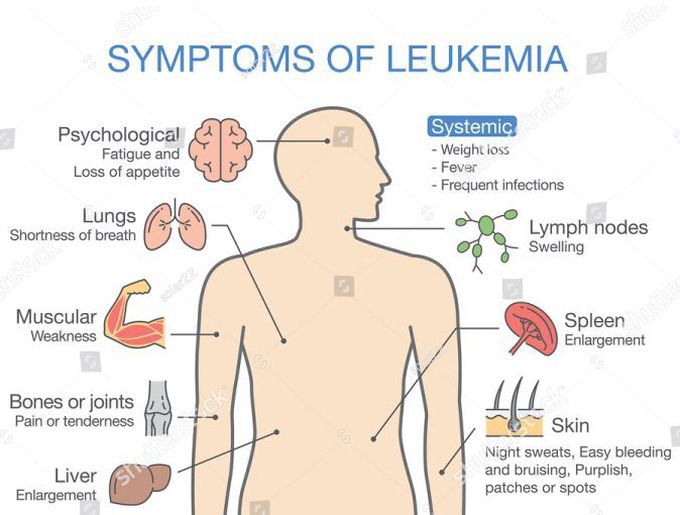

Leukemia
Leukemia is cancer of the body's blood-forming tissues, including the bone marrow and the lymphatic system. Many types of leukemia exist. Some forms of leukemia are more common in children. Other forms of leukemia occur mostly in adults. Leukemia usually involves the white blood cells. Your white blood cells are potent infection fighters — they normally grow and divide in an orderly way, as your body needs them. But in people with leukemia, the bone marrow produces abnormal white blood cells, which don't function properly. Treatment for leukemia can be complex — depending on the type of leukemia and other factors. But there are strategies and resources that can help to make your treatment successful. Leukemia symptoms vary, depending on the type of leukemia. Common leukemia signs and symptoms include: Fever or chills Persistent fatigue, weakness Frequent or severe infections Losing weight without trying Swollen lymph nodes, enlarged liver or spleen Easy bleeding or bruising Recurrent nosebleeds Tiny red spots in your skin (petechiae) Excessive sweating, especially at night Bone pain or tenderness. The major types of leukemia are: Acute lymphocytic leukemia (ALL). This is the most common type of leukemia in young children. ALL can also occur in adults. Acute myelogenous leukemia (AML). AML is a common type of leukemia. It occurs in children and adults. AML is the most common type of acute leukemia in adults. Chronic lymphocytic leukemia (CLL). With CLL, the most common chronic adult leukemia, you may feel well for years without needing treatment. Chronic myelogenous leukemia (CML). This type of leukemia mainly affects adults. A person with CML may have few or no symptoms for months or years before entering a phase in which the leukemia cells grow more quickly. Other types. Other, rarer types of leukemia exist, including hairy cell leukemia, myelodysplastic syndromes and myeloproliferative disorders. Factors that may increase your risk of developing some types of leukemia include: Previous cancer treatment. People who've had certain types of chemotherapy and radiation therapy for other cancers have an increased risk of developing certain types of leukemia. Genetic disorders. Genetic abnormalities seem to play a role in the development of leukemia. Certain genetic disorders, such as Down syndrome, are associated with an increased risk of leukemia. Exposure to certain chemicals. Exposure to certain chemicals, such as benzene — which is found in gasoline and is used by the chemical industry — is linked to an increased risk of some kinds of leukemia. Smoking. Smoking cigarettes increases the risk of acute myelogenous leukemia. Family history of leukemia. If members of your family have been diagnosed with leukemia, your risk of the disease may be increased.

